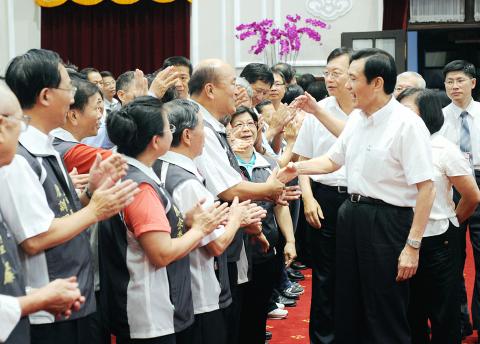President Ma Ying-jeou’s (馬英九) popularity has plunged to its lowest level yet, a poll showed yesterday, amid a bribery scandal involving a top official who had been a key confidant.
Ma’s approval rating fell to 15 percent, according to the survey of 1,303 people conducted by the cable news channel TVBS this week, after former Executive Yuan secretary-general Lin Yi-shih (林益世) admitted taking bribes from a businessman.
Ma’s previous lowest approval rating was 16 percent in August 2009 in another TVBS poll, following Typhoon Morakot, which killed more than 600 people and triggered widespread criticism that his government reacted too slowly.

Photo: CNA
A record high of 64 percent said this week they have no faith in Ma’s future performance, while 78 percent said his administration has poor crisis-management skills, according to the latest poll.
Ma also saw his popularity dive 25 percentage points from a January poll conducted by the channel less than two weeks before he was re-elected for a second term.
Observers said Lin’s bribery case dealt a heavy blow to Ma, who won his second term pledging to fight corruption after former president Chen Shui-bian (陳水扁) was implicated in several graft cases.
Lin, a former vice chairman of the Chinese Nationalist Party (KMT), was taken into custody on Tuesday after he admitted wrongdoing in a case that also implicated his mother and his wife.
Prosecutors did not specify how much money was involved, but a businessman alleged that Lin was paid NT$63 million (US$2.15 million) to help him gain a contract with a state firm two years ago.
Lin was also accused of soliciting another bribe of NT$83 million this year from the same businessman, who took the story to the media.

NATIONAL SECURITY THREAT: An official said that Guan Guan’s comments had gone beyond the threshold of free speech, as she advocated for the destruction of the ROC China-born media influencer Guan Guan’s (關關) residency permit has been revoked for repeatedly posting pro-China content that threatens national security, the National Immigration Agency said yesterday. Guan Guan has said many controversial things in her videos posted to Douyin (抖音), including “the red flag will soon be painted all over Taiwan” and “Taiwan is an inseparable part of China,” while expressing hope for expedited “reunification.” The agency received multiple reports alleging that Guan Guan had advocated for armed reunification last year. After investigating, the agency last month issued a notice requiring her to appear and account for her actions. Guan Guan appeared as required,

Japan and the Philippines yesterday signed a defense pact that would allow the tax-free provision of ammunition, fuel, food and other necessities when their forces stage joint training to boost deterrence against China’s growing aggression in the region and to bolster their preparation for natural disasters. Japan has faced increasing political, trade and security tensions with China, which was angered by Japanese Prime Minister Sanae Takaichi’s remark that a Chinese attack on Taiwan would be a survival-threatening situation for Japan, triggering a military response. Japan and the Philippines have also had separate territorial conflicts with Beijing in the East and South China

A strong cold air mass is expected to arrive tonight, bringing a change in weather and a drop in temperature, the Central Weather Administration (CWA) said. The coldest time would be early on Thursday morning, with temperatures in some areas dipping as low as 8°C, it said. Daytime highs yesterday were 22°C to 24°C in northern and eastern Taiwan, and about 25°C to 28°C in the central and southern regions, it said. However, nighttime lows would dip to about 15°C to 16°C in central and northern Taiwan as well as the northeast, and 17°C to 19°C elsewhere, it said. Tropical Storm Nokaen, currently

PAPERS, PLEASE: The gang exploited the high value of the passports, selling them at inflated prices to Chinese buyers, who would treat them as ‘invisibility cloaks’ The Yilan District Court has handed four members of a syndicate prison terms ranging from one year and two months to two years and two months for their involvement in a scheme to purchase Taiwanese passports and resell them abroad at a massive markup. A Chinese human smuggling syndicate purchased Taiwanese passports through local criminal networks, exploiting the passports’ visa-free travel privileges to turn a profit of more than 20 times the original price, the court said. Such criminal organizations enable people to impersonate Taiwanese when entering and exiting Taiwan and other countries, undermining social order and the credibility of the nation’s